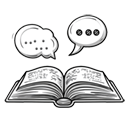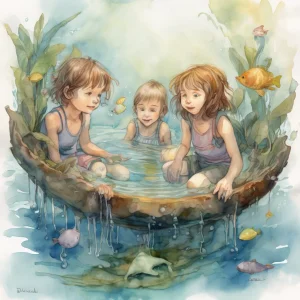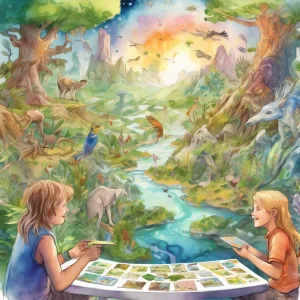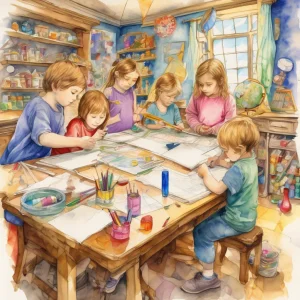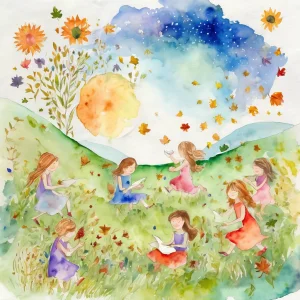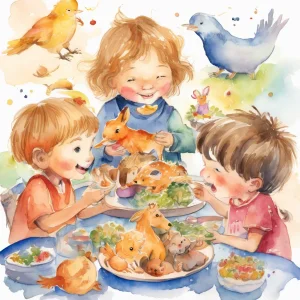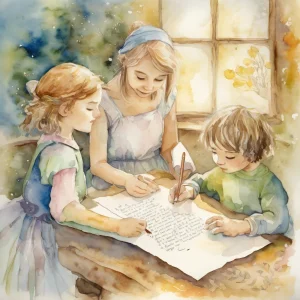Activity
Similar Activities
Nature's Objects: Exploring Buoyancy Adventure
Children’s Age: 6–7 years
Activity Duration: 10 minutes
An engaging hands-on activity for children aged 6-7 to explore buoyancy with natural objects.
Activity Duration: 10 minutes
Shadow Hunt and Solar Exploration
Children’s Age: 5–6 years
Activity Duration: 10 – 30 minutes
An activity combining Physics, Space, and Ecological Awareness for children aged 5-6 to explore shadows and solar energy.
Activity Duration: 10 – 30 minutes
Space Collage Adventure: Crafting Cosmic Creativity Journey
Children’s Age: 3–8 years
Activity Duration: 10 – 20 minutes
Embark on a Space Collage Adventure where you can make cool space scenes using paper, scissors, and glue. Learn about space while creating your own unique collages with markers and…
Activity Duration: 10 – 20 minutes
Starry Skies: Rocket Launch Adventure
Children’s Age: 6–10 years
Activity Duration: 25 minutes
"Rocket Launch Adventure" is an outdoor activity that engages children in a fun and interactive experience while promoting communication skills, play skills, and introducing basic …
Activity Duration: 25 minutes
Ecosystem Adventure Board Game - Nature's Quest
Children’s Age: 7–9 years
Activity Duration: 10 – 25 minutes
An interactive board game where children explore and learn about ecosystems through challenges and tasks.
Activity Duration: 10 – 25 minutes
Enchanted Measurement Adventures: Measuring Real-World Objects Scavenger Hunt
Children’s Age: 5–10 years
Activity Duration: 10 – 20 minutes
An educational activity engaging children in measuring real-world objects through a fun scavenger hunt.
Activity Duration: 10 – 20 minutes
Whispers of the Seasons: Seasonal Collage Exploration
Children’s Age: 5–6 years
Activity Duration: 10 minutes
Engaging activity where children create collages representing different seasons.
Activity Duration: 10 minutes
Animal Feast Adventure: A Whimsical Feeding Frenzy
Children’s Age: 5–8 years
Activity Duration: 10 – 25 minutes
An interactive activity where children feed toy animals with pretend food, promoting communication skills and adaptive development.
Activity Duration: 10 – 25 minutes
Gratitude Journey: Writing Thank-You Notes Experiment
Children’s Age: 6–8 years
Activity Duration: 10 – 20 minutes
A creative activity for children aged 7-8 to write thank-you notes, enhancing cognitive and communication skills.
Activity Duration: 10 – 20 minutes
Cultural Creatures: Stop-Motion Animation Adventure
Children’s Age: 4–9 years
Activity Duration: 10 – 25 minutes
An interactive activity using technology to create stop-motion animations exploring plants and animals from diverse cultures.
Activity Duration: 10 – 25 minutes
Enchanted Discovery: Nature Scavenger Hunt with a Twist
Children’s Age: 7–8 years
Activity Duration: 10 minutes
An outdoor educational activity for children aged 7-8 involving a nature scavenger hunt with historical items, leading to a nature collage creation.
Activity Duration: 10 minutes
Nature-Inspired Drawing Activity
Children’s Age: 8–9 years
Activity Duration: 10 – 25 minutes
An outdoor activity where children draw natural elements to foster creativity and ecological awareness.
Activity Duration: 10 – 25 minutes



